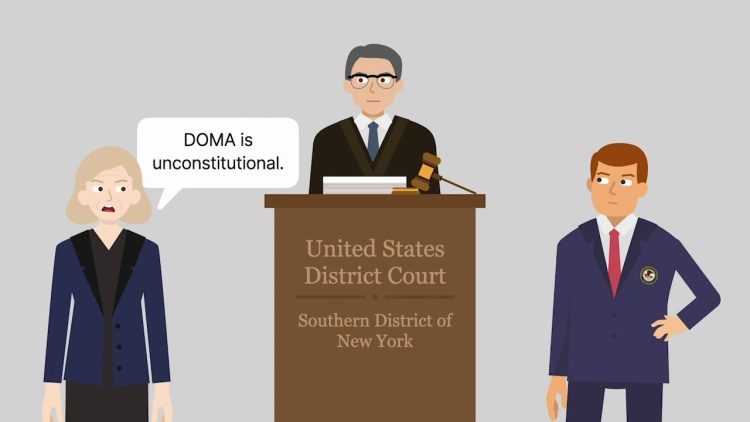Windsor v. United States
United States District Court for the Southern District of New York
797 F. Supp. 2d 320 (2011)
- Written by Angela Patrick, JD
Facts
Edith Windsor (plaintiff) was married to Thea Spyer under New York State law. Spyer died in 2009. At that time, the Defense of Marriage Act (DOMA) prohibited the federal government from recognizing same-sex marriages. Accordingly, the Internal Revenue Service treated the two women as unmarried and required Spyer’s estate to pay approximately $363,000 in federal tax on Windsor’s inheritance. If the two women had been considered married, this tax would have been waived under the estate-tax marital deduction. As the executor of Spyer’s estate, Windsor sued the United States (defendant), alleging that DOMA violated the Equal Protection Clause and was unconstitutional. Initially, the Department of Justice (DOJ) filed an answer on behalf of the United States supporting DOMA’s constitutionality. However, the DOJ later notified the district court that the DOJ would not continue to defend DOMA’s constitutionality. The DOJ also notified the speaker of the House of Representatives of the DOJ’s position. Soon after, the House’s Bipartisan Legal Advisory Group (BLAG) filed a motion to intervene to defend DOMA’s constitutionality. The DOJ did not oppose BLAG’s appearing in the case. However, the DOJ argued that BLAG should be limited to making substantive arguments in favor of DOMA’s constitutionality and that the DOJ alone should have authority to file procedural motions. BLAG opposed the limited role and sought to intervene as a full party. The district court considered the intervention request.
Rule of Law
Issue
Holding and Reasoning (Francis, J.)
What to do next…
Here's why 905,000 law students have relied on our case briefs:
- Written by law professors and practitioners, not other law students. 47,100 briefs, keyed to 995 casebooks. Top-notch customer support.
- The right amount of information, includes the facts, issues, rule of law, holding and reasoning, and any concurrences and dissents.
- Access in your classes, works on your mobile and tablet. Massive library of related video lessons and high quality multiple-choice questions.
- Easy to use, uniform format for every case brief. Written in plain English, not in legalese. Our briefs summarize and simplify; they don’t just repeat the court’s language.





